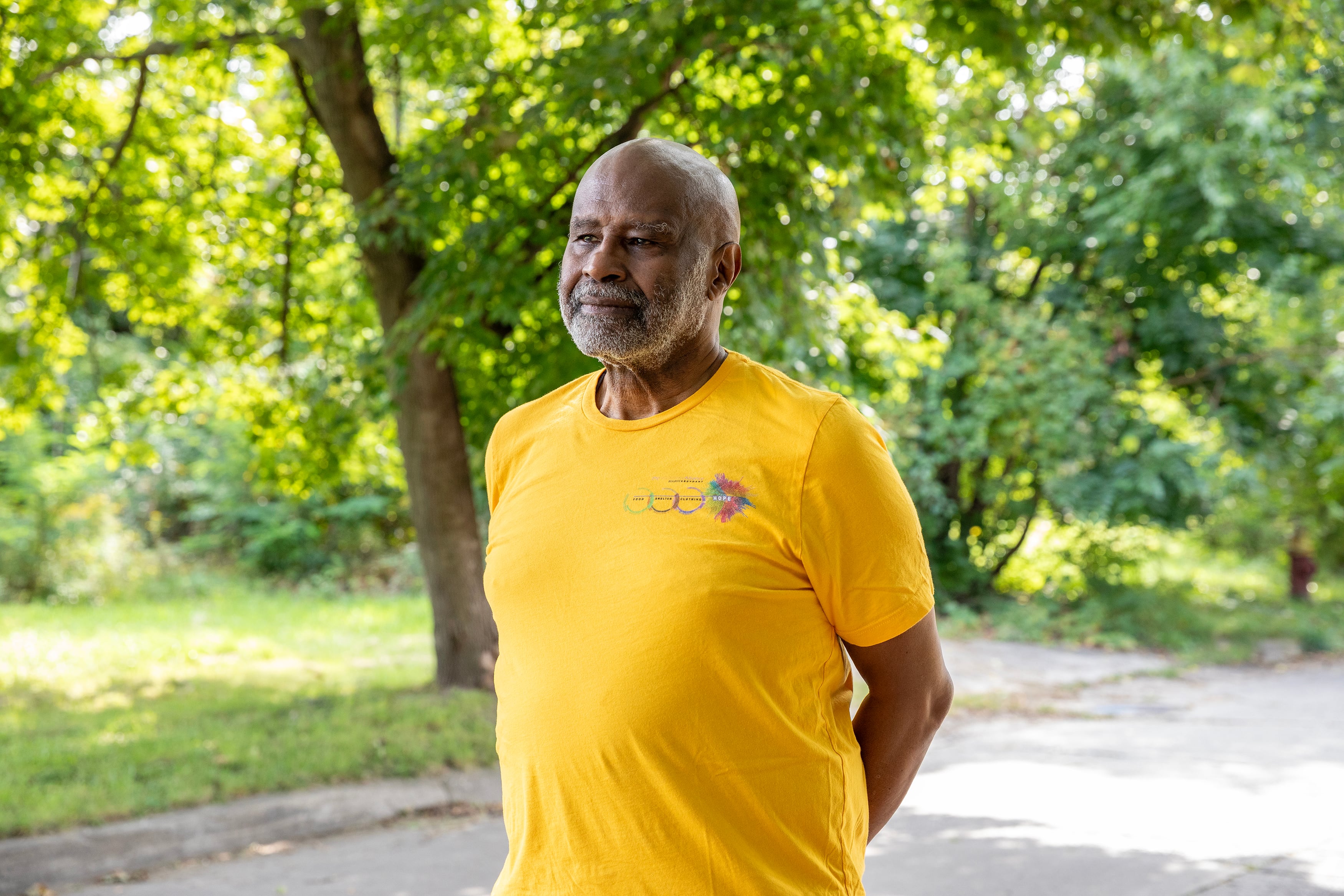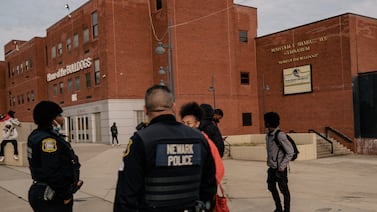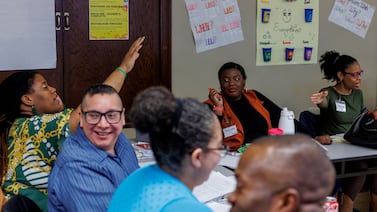At Chalkbeat Detroit, we take seriously our mission to inform readers about efforts to improve public education in Michigan and explain how inequities create barriers to learning.
Crucial to our work is ensuring that the voices of the people who have the most at stake — students, parents, advocates, teachers, and other school staff — are front and center.
That’s part of our regular reporting. But we also elevate these voices with special features, such as first-person essays, How I Teach features, interview Q&As, and other formats.
As we wrap up 2023, we’re looking back at some of the voices we showcased over the last 12 months. Below, you’ll see highlights of those pieces.
And as always, if you have a story you’d like to share, or know of a voice that deserves to be heard, please reach out to us at detroit.tips@chalkbeat.org.
Confronting racial violence with tenderness
I am required to teach Abraham Lincoln and how he signed the Emancipation Proclamation, but not about the felony disenfranchisement that keeps many of my students’ families from experiencing true freedom.
— N’Kengé Robertson
Detroit teacher N’Kengé Robertson tackled issues of racial violence and identity in this first-person piece. She explains that learning materials often leave out “critical conversations of race, gender, religion, language, and sexuality,” and fail to capture the lived experiences of students they’re supposed to reach. To address that, she said, she worked with her high school students to “improve the situation by compiling new resources, reshaping our lessons, and moving away from Eurocentric narratives in our classroom.”
Detroit students shed light on the need for self-love, inner peace
The pandemic has done a number on me. I don’t and can’t go anywhere, can’t sleep some nights, always see the negative before the positive, and I doubt almost everything and everyone around me.
— TaMyra Smith
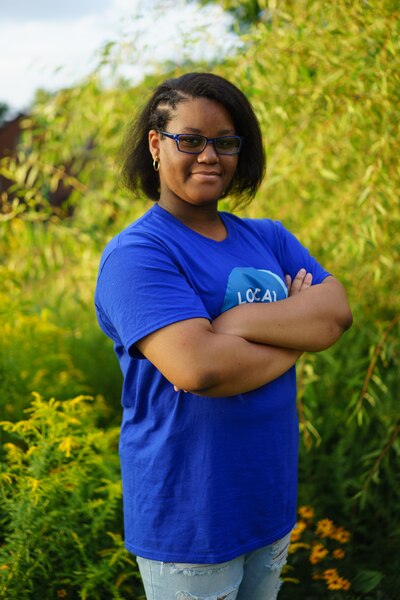
In February, we published excerpts of student-written pieces about mental health that shed light on some of the post-pandemic struggles students are facing. The writing was part of a project of an organization called Local Circles. The participants included one student who said she struggled with depression, and another who urged students to seek help when they need it. For the most part, they agreed that self-love and inner peace are important for their healing. There is still widespread concern about the mental health challenges of students who are grappling with the after-effects of the pandemic. Adults trying to address this must listen to what young people are saying they need.
A Detroit man’s passion for getting kids to school every day
It was heartbreaking to me to see these children squandering an opportunity that later in life they’ll have to pay to get.
— Larry Simmons
Chronic absenteeism has been a major storyline for Chalkbeat Detroit for more than a year. We’ve given readers a close-up view of one Detroit school’s efforts to get students to school regularly, the role community agencies have played, and barriers to improving attendance, such as spotty transportation and a state policy that punishes the parents of chronically absent students. In this interview Q&A, retired pastor Larry Simmons talked about what drove his years-long effort to help get kids in school regularly, and what it felt like to see children walking around his neighborhood when they should have been in school.
Looking at the world through a similar lens at Michigan camp

I rejoice in thoughts that my lost friends are running around happy and alive in the afterlife; at the same time, my heart aches, because they are no longer by my side.
— Torrance Johnson
Detroit teen Torrance Johnson wrote a first-person piece, a version of which was initially published by the Detroit Writing Room, about how a camp in Lexington, Michigan, for children with muscular dystrophy changed his life. Going to this camp each year gave him an opportunity to be around other children like him who have muscular dystrophy. He wrote of the joys that brought, but also the sadness of losing friends.
Adults failed her when she was a kid. Now she is a watchdog for children.
No adults ever took the time to ask what was behind my surface-level behavioral issues … despite best practices and what research tells us about kids who “act up.”
— Hannah Dellinger

Chalkbeat Detroit reporter Hannah Dellinger, who joined our team in June, wrote an intensely personal essay about her experiences overcoming trauma. The sexual abuse she suffered as a young child led to behavior problems in school — signs of the trauma that adults ignored. Hannah’s piece illustrates not only the importance of having school staff trained to meet the needs of students struggling with trauma, but also how important it is for adults to be able to act on telltale signs that a student isn’t just acting out, but perhaps exhibiting the effects of trauma.
This Detroit teacher’s mission: Bring back school libraries
I really need to impress and stress how important going to school is and the work that students do there, not only because they’re young and they’re learning, but also because it has long-term ramifications for their life. The absence of libraries is an atrocity.
— Josie Silver
Josie Silver teaches early elementary grades in the Detroit school district, and one thing she’s passionate about is equipping her children with books that will fuel their love of learning. Chalkbeat highlighted Silver as part of its regular How I Teach column, in part because the educator had been named a Michigan Collaborative Teacher Leader. Silver talked about the need for school libraries, and the challenges she has faced teaching students who are still struggling to rebound academically from the pandemic.
Detroit student who fought for ‘right to literacy’ is still in the fight
We obligate children to go to schools, but we don’t obligate schools to teach.
— Jamarria Hall

Jamarria Hall was the face of the historic 2016 “right to read” lawsuit that argued state officials failed to provide a basic reading education when they oversaw the Detroit school district between 2009 and 2016 under emergency management. Hall was a high school student when that lawsuit was filed, and became the lead plaintiff. Now 23, he told Chalkbeat in this interview that he sees the $94 million the state allocated this year to the district — part of a 2021 settlement of the case — as a way for young people to have a say in their future.
Michigan’s History Teacher of the Year helps educators combat racist myths
The world is such a fascinating place. Each student has passion and curiosity inside them, and I am so honored whenever I can play a small part in igniting these things.
— Matt Vriesman

In 2020, as the nation was undergoing a racial reckoning after the murder of George Floyd, an administrator asked social studies teacher Matt Vriesman to share resources with other teachers. Vriesman had already adapted his own classroom lessons after realizing that state standards don’t always provide an accurate view of race, slavery, and injustice. That request turned into something bigger than his East Kentwood High School building. Vriesman, whom Chalkbeat featured in a How I Teach piece after he was named Michigan History Teacher of the Year, created a website that provides antiracism resources for Advanced Placement teachers across the nation. This work is important to Vriesman, who teaches at one of the most diverse schools in the state. “We are always looking for new ways to bring in the knowledge and experience of our students into the classroom,” he said. “It makes world history so much more ‘real’ for students.”
Michigan’s top teacher wants more focus on mental health, learning recovery
Many children are dealing with mental health issues themselves or dealing with the mental health issue of a parent or caregiver. In Michigan, we need to put as much time, resources, and funding into meeting the students’ mental needs as we do their physical and educational needs.
— Candice Jackson
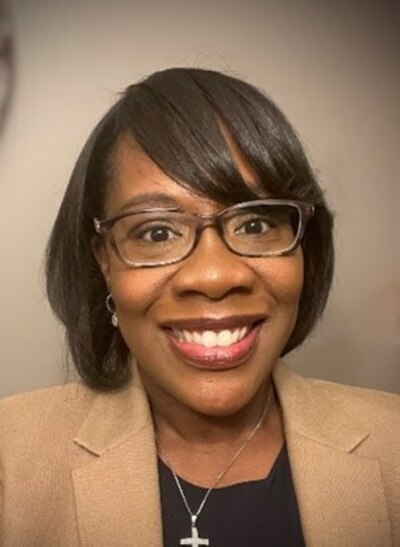
Soon after being named Michigan’s Teacher of the Year, Candice Jackson used her new platform to push for schools to address the academic and mental health needs that have lingered as schools attempt to help students recover from the pandemic. Williams, the first Detroit district teacher to be recognized as the state’s top teacher since the 2006-07 school year, told Chalkbeat that students need counseling services and social-emotional learning programs to get back on track. That will pay off academically, she said, because stronger mental health “enhances academic performance, supports overall well-being, enables early interventions, and has short-term and long-term positive outcomes for students.”
Lori Higgins is the bureau chief for Chalkbeat Detroit. You can reach her at lhiggins@chalkbeat.org.


